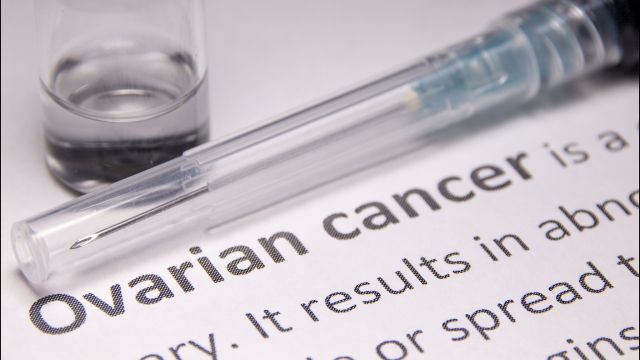Close to 300 women die of ovarian cancer in Ireland every year, yet four out of five women do not know the symptoms to look out for in relation to the condition, according to a survey carried out by the Irish Network for Gynaecological Oncology (INGO).
The survey of 522 women was carried out last month by Behaviour and Attitudes research company. It was published to coincide with World Ovarian Cancer Day.
It found that eight out of 10 Irish women are not confident they could spot the symptoms of ovarian cancer early.
This arises out of the fact that the symptoms of ovarian cancer can be similar to conditions such as irritable bowel syndrome.
The INGO – which is a network of over thirty of Ireland's foremost gynaecological cancer campaigners, researchers and patient advocates – says more than three quarters of patients with ovarian cancer are diagnosed when the disease is at a late stage.
Symptoms
Four in five recognise that a persistent pain in the abdomen (80 per cent) and/or a persistent pain in the pelvis (79 per cent) could be a sign of ovarian cancer
Three in four recognise that persistent bloating (74 per cent) or an increased abdominal size on most days (73 per cent) could be a sign of ovarian cancer. However, the INGO says there is concern that most women did not recognise two other common symptoms of ovarian cancer:
Just one in two (51 per cent) recognise that feeling persistently full and less than two in five (39 per cent) recognise that difficulty eating on most days could be a sign of ovarian cancer.
Just under two in five (39 per cent) recognise that passing urine more frequently than usual, and one in two (49 per cent) believe that changes in bowel habit could be signs of ovarian cancer.
Ovarian cancer patient Deirdre O’Raw spoke to RTÉ's Morning Ireland about her diagnosis. Ms O'Raw said that everyone knows their own bodies and if you notice any changes or anything unusual that lasts more than a few weeks then it should get checked out.
Ms O'Raw said she woke up one night in July 2020 with a pain in the right side of her abdomen.
"The first thing I thought of was appendicitis. I rang my doctor the next day and he sent me up to A&E. They ran tests and two days later I was told I had ovarian cancer."
Ms O'Raw said in hindsight she can see that she had symptoms of ovarian cancer prior to the summer of 2020.
"I was completely ignorant at the time of the signs of ovarian cancer. I didn't know them. In February (of 2020) I put on 10 kilos in the space of two weeks. When I looked in the mirror I looked pregnant.
"And at the end of June/ the beginning of July I went out and ate food. I woke up the next day and my stomach had swollen hard. I thought it was IBS.
"If you notice anything different in your own body that lasts for a period of time go and get checked out. Chances are it may not be anything. But the earlier people get diagnosed the better chance of success you have with your treatment and survival rate."
Meanwhile, the INGO has launched a campaign to highlight the symptoms of ovarian cancer. This includes bloating that is persistent and doesn’t come and go, eating less and feeling full more quickly, abdominal and pelvic pain you feel most days and toilet changes in urination or bowel habits.
The clear message is that if a woman experiences any of these symptoms for three weeks or more, she should contact her GP.
Screening tests
The campaign also seeks to dispel the myth that cervical screening detects ovarian cancer. The research showed that while seven in ten women correctly know that the CervicalCheck Screening Programme assesses whether a woman is at risk of having cervical cancer, one in three women (34 per cent) mistakenly believe that cervical screening checks for all five gynaecological cancers (ovarian, cervical, uterine, vulva and vaginal).
" It is important for women to understand that cervical screening only checks whether a woman is at risk of having cervical cancer and no other cancer type. "
The research also found that women are confused about factors that can increase a woman’s chance of developing ovarian cancer.
Close to three in five (57 per cent) said it was unrelated to age whilst less than a third of women (29 per cent) believe genetics is a risk factor for ovarian cancer.
In fact the INGO says that more than 8 out of every 10 cases of ovarian cancer occur in people aged 50 years and older, so people in this age group should be especially alert for symptoms of ovarian cancer. All women are at risk of developing ovarian cancer regardless of age. However, the median age when diagnosed with ovarian cancer is age 65.
"This can be younger for those who carry a genetic predisposition or have a family history. It is important to communicate family history of cancer to your GP due to the increased risk of ovarian cancer. "
Annually, approximately 400 women are diagnosed with ovarian cancer. Ovarian cancer is the fourth leading cause of cancer death in women in Ireland, after lung, breast and colorectal cancer. There is no standard screening test to pick up ovarian cancer in women who don’t have symptoms.
The INGO says early diagnosis can significantly improve survival – more than 8 out of 10 patients diagnosed with stage one ovarian cancer are alive five years after diagnosis compared to just 1 in 6 people diagnosed with stage four ovarian cancer.
Karen Cadoo, medical oncologist and cancer geneticist in St James's Hospital in Dublin, said approximately 20 per cent of women diagnosed with ovarian cancer have a genetic reason for their cancer.
"This information can be important for their treatment for some women. It is also very important for their family members so that they can understand and reduce their ovarian cancer risk.”

Dr Sharon O’Toole, senior research fellow in Trinity College Dublin and coordinator of the World Ovarian Cancer Day campaign at INGO, told Morning Ireland that it is important to highlight that there is no screening for ovarian cancer and that cervical screening does not check for all gynaecological cancers.
Dr O'Toole said one of the difficulties with ovarian cancer is that people often feel that they have digestive problems rather than ovarian cancer.
"As Deirdre said she thought it was irritable bowel syndrome. But irritable bowel syndrome rarely starts in your fifties for the first time so be aware of that. If something is new and persistent get it checked out."
As part of World Ovarian Cancer Day activities OvaCare, an ovarian cancer support charity will be hosting a coffee and chat event in the Ashling hotel, Dublin from 11am to 1pm on May 13th. This is a free event and an opportunity for fellow patients to meet. For registration please visit https://ovacare.ie/events/event-registration







